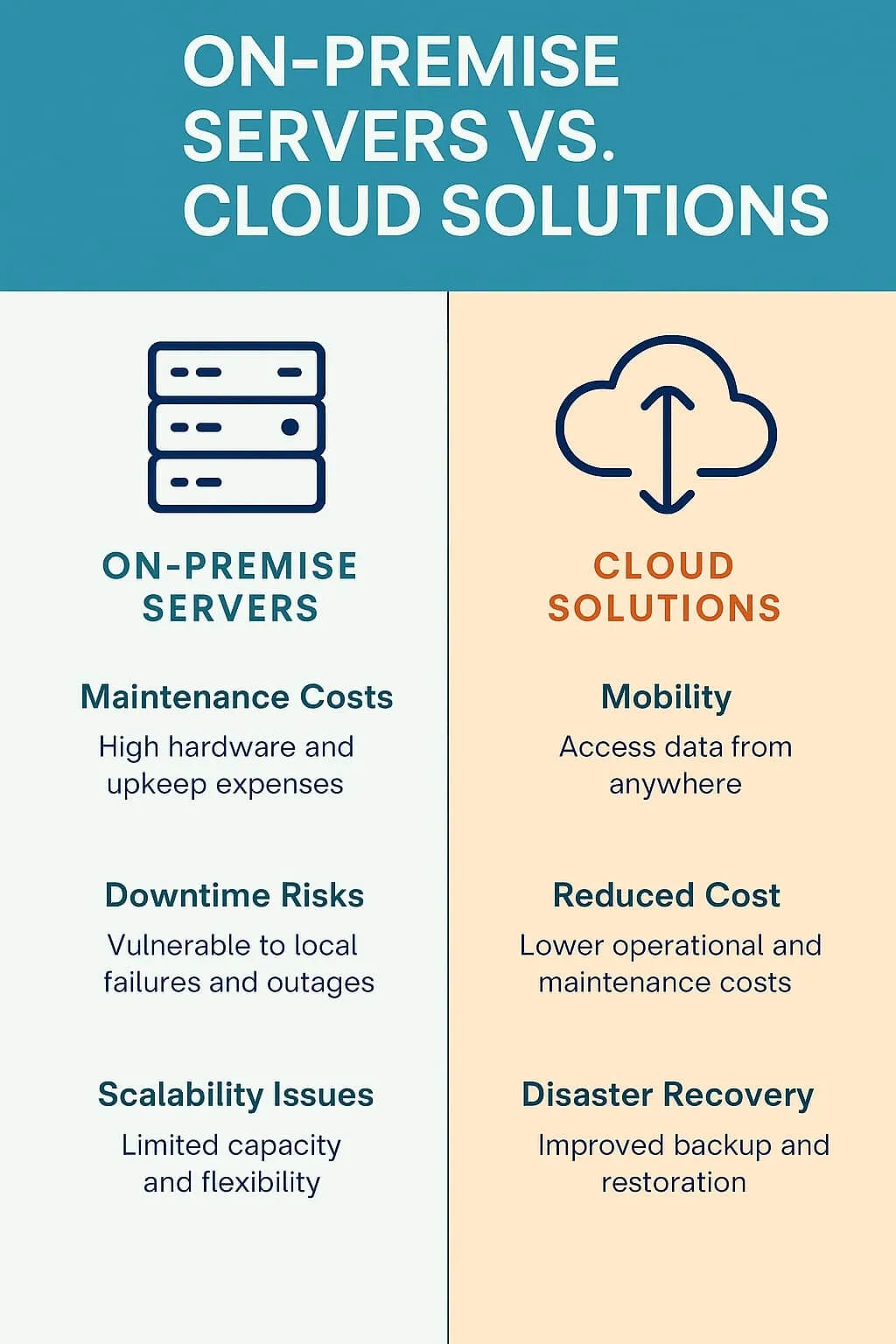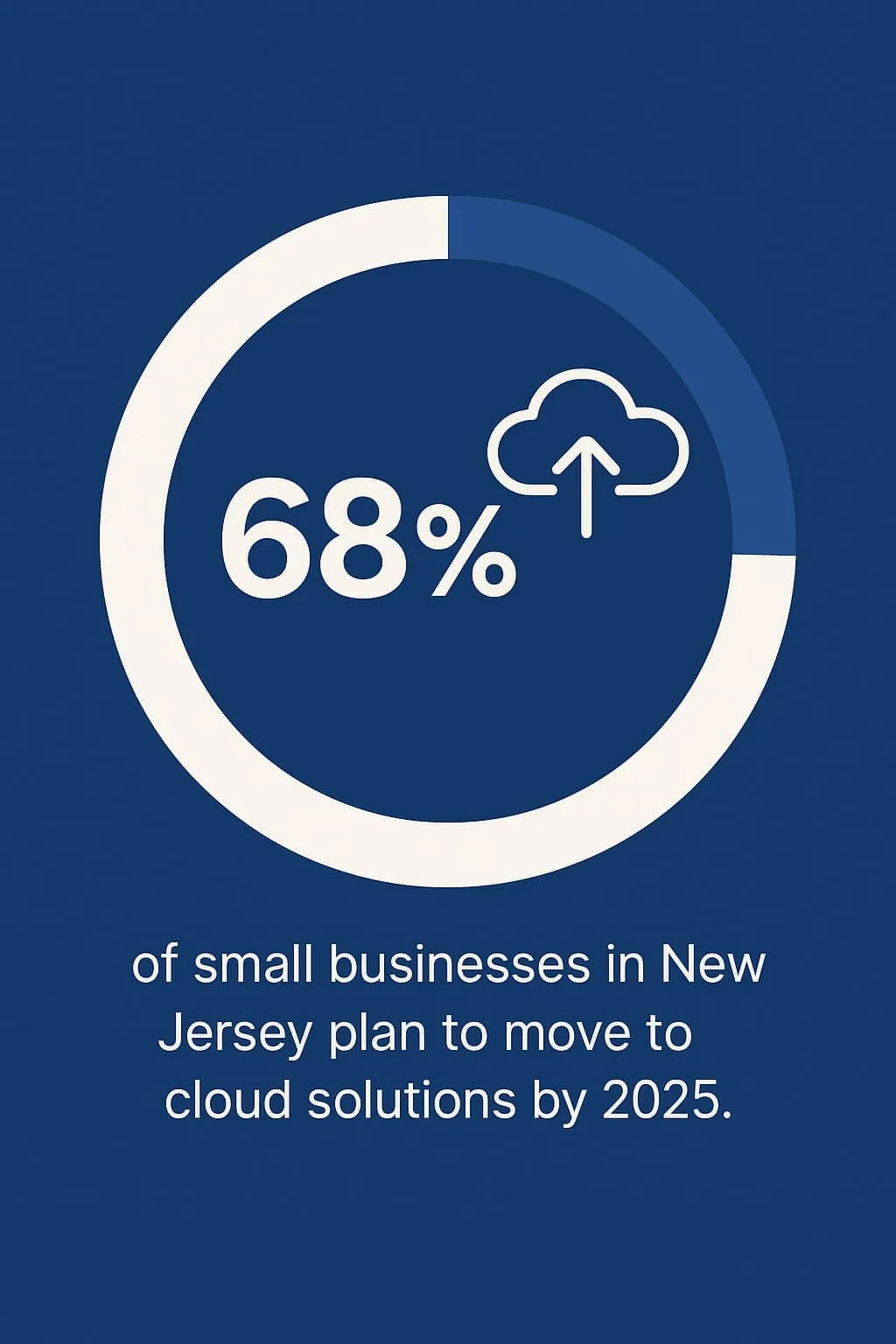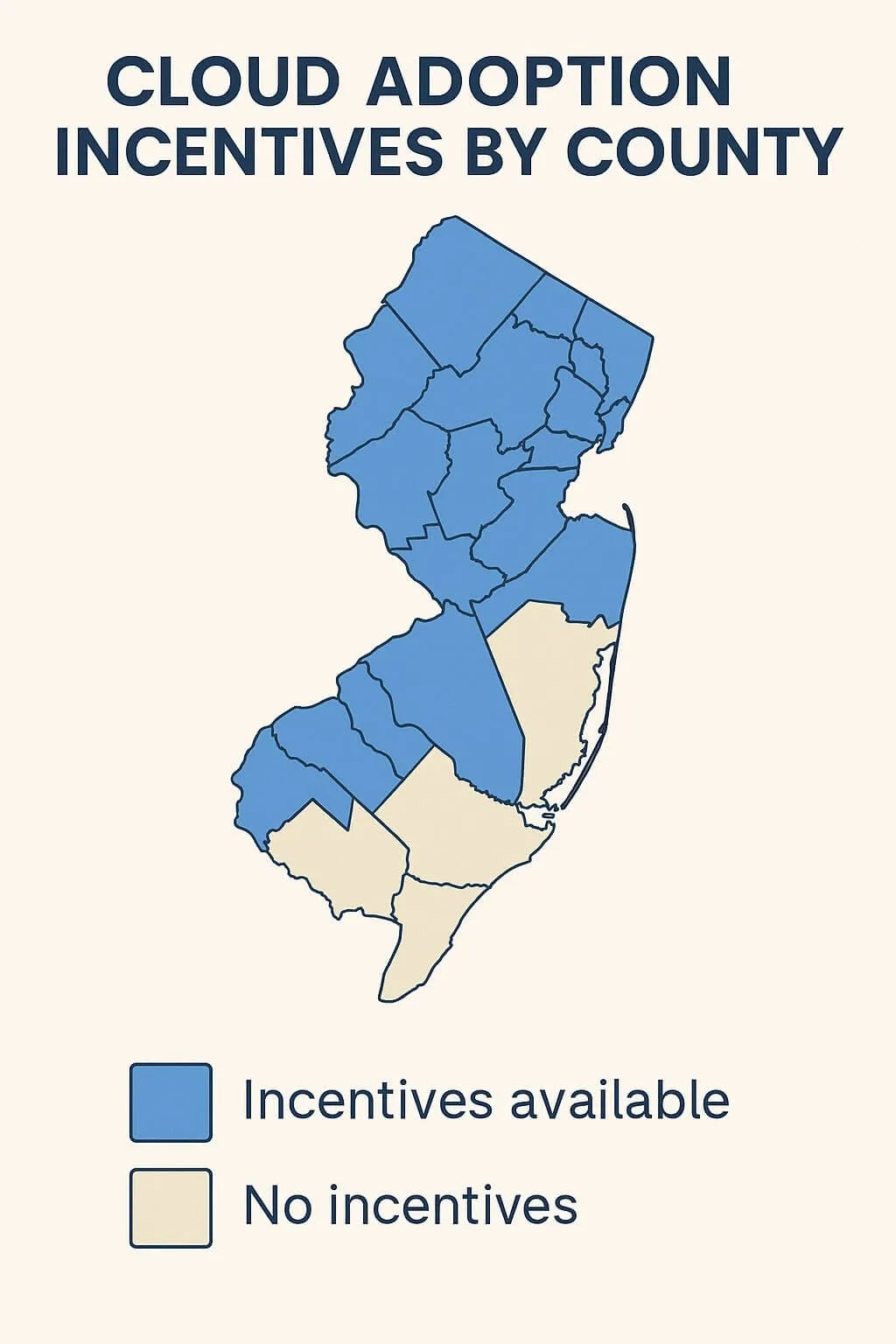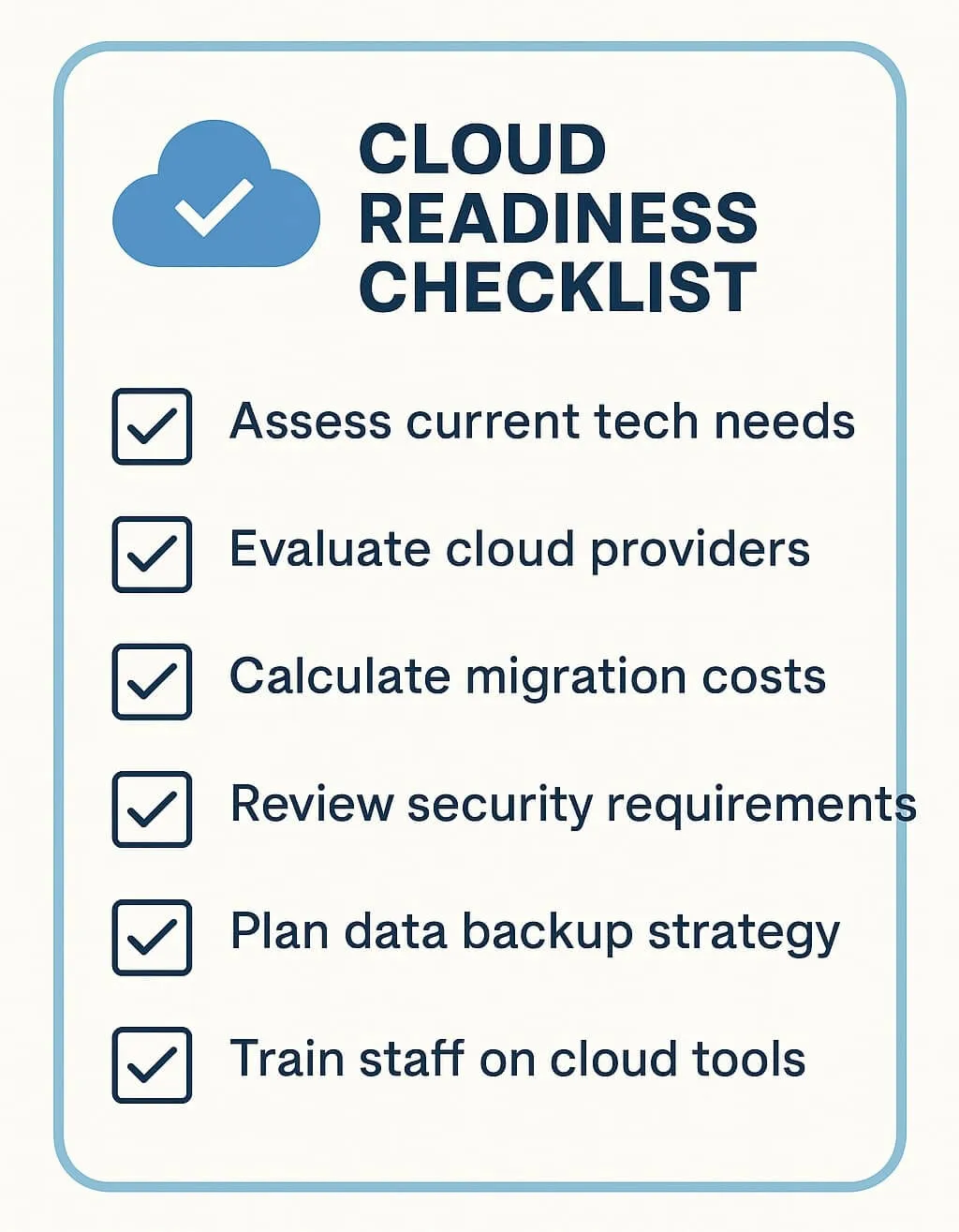From Chaos to Cloud: Why New Jersey SMBs Are Switching from Local Servers in 2026
Discover why small businesses in New Jersey are leaving local servers behind and moving to the cloud in 2026. Lower costs, better security, and smoother operations.

Introduction: A Shift Years in the Making
In 2025, the buzz around cloud computing is no longer hype—it's a reality, especially for small and mid-sized businesses (SMBs) in New Jersey. Traditional local servers that once seemed reliable are now being replaced by flexible, secure, and scalable cloud environments. But why are so many SMBs making the leap this year? And more importantly, what’s driving New Jersey businesses, in particular, to abandon on-site infrastructure?
The Problems With Local Servers for New Jersey SMBs
For years, businesses across Newark, Jersey City, and the greater Garden State relied on physical servers tucked away in backrooms or office closets. But these setups have come with increasing headaches.
1. High Maintenance Costs
From power consumption and hardware repairs to IT staffing needs, maintaining local servers drains both time and money. For SMBs, these expenses can be crippling.
2. Limited Scalability
Growth should be a good thing, but with local servers, expanding storage or capacity requires more hardware—and that means more downtime and more investment.
3. Vulnerability to Disasters
New Jersey weather is no stranger to floods, snowstorms, and power outages. One mishap could wipe out data stored on a physical server if not properly backed up.
4. Security Gaps
Keeping up with evolving cyber threats requires constant updates and oversight—something smaller teams often can’t handle in-house.

Why Cloud Adoption in New Jersey Is Accelerating in 2025
1. Lower Operational Overhead
Switching to cloud platforms eliminates the cost of hardware upkeep, lowers utility bills, and reduces the burden on internal IT staff. SMBs now opt for predictable, monthly cloud subscriptions over surprise server expenses.
2. Remote Work Made Simple
With many New Jersey businesses offering hybrid or remote work options, cloud services enable teams to access files and systems from anywhere—without setting up complicated VPNs or dragging around hard drives.
3. State Incentives & Tech Grants
In 2025, New Jersey continues offering incentives for SMBs upgrading their digital infrastructure. That includes funding for cybersecurity upgrades, disaster recovery planning, and cloud migrations—making it easier for businesses to modernize.
4. Easy Integration with Business Tools
Cloud platforms now integrate seamlessly with CRMs, inventory systems, customer service apps, and industry-specific software. This level of connectivity has become a game-changer for efficiency.

Real Results: What SMBs Are Gaining from Going Cloud
Enhanced Cybersecurity
Cloud providers now offer end-to-end encryption, multi-factor authentication, real-time threat monitoring, and compliance support (HIPAA, SOC 2, PCI-DSS, etc.), giving small businesses enterprise-level protection.
Faster Disaster Recovery
With cloud backup and recovery, businesses can restore their systems within hours—not days. That’s critical in industries where downtime equals lost revenue, like healthcare, retail, and logistics.
Scalable Growth
Whether a company is onboarding 5 employees or 50, the cloud can scale effortlessly. Storage, user access, and computing power can grow (or shrink) as needed, without capital investments.

How SMBs in New Jersey Are Making the Transition
Step 1: Cloud Readiness Assessment
Many businesses start by evaluating their current IT setup, identifying vulnerabilities, and outlining goals for what they want from the cloud.
Step 2: Choosing the Right Cloud Partner
From local IT consultants in Bergen County to cloud providers in Princeton, SMBs are seeking experienced partners who offer hands-on migration support and understand local business regulations.
Step 3: Migrating Critical Systems First
Email, file sharing, and customer management systems are often migrated first, followed by accounting, HR, and other core functions.
Step 4: Training and Adoption
Successful transitions include staff training and updates to internal processes to take full advantage of cloud capabilities.

Local Spotlight: Industries Leading the Cloud Shift
Law Firms
With growing cybersecurity concerns and the need for secure document access, law offices in Essex and Hudson counties are embracing cloud-based case management.
Medical Practices
Cloud platforms help small clinics and dental offices in New Brunswick and Trenton manage patient records more securely while remaining HIPAA-compliant.
Construction & Real Estate
From project management tools to mobile document sharing on job sites, cloud services are helping teams across Camden and Morris counties stay connected and efficient.
Common Misconceptions Holding SMBs Back
“Cloud is only for big corporations.”
Not true. Today’s cloud services are tailored for SMBs, offering flexible pricing, simple onboarding, and minimal IT staff requirements.
“We’ll lose control of our data.”
Actually, you gain more control—with dashboards, access logs, and user permissions. Data is more organized and trackable than ever.
“Migration will disrupt our operations.”
Modern migrations are designed to be seamless. Many businesses migrate without any downtime using phased approaches and weekend cutovers.
FAQ: Cloud Adoption for New Jersey SMBs
Q: How much does it cost to migrate to the cloud?
A: Costs vary depending on data volume, users, and platform. Many SMBs spend less on cloud services monthly than they did on server maintenance annually.
Q: Is the cloud really secure enough for sensitive data?
A: Yes. Reputable providers offer robust security protocols, encryption, and compliance with industry standards.
Q: Will I need to hire more IT staff to manage cloud systems?
A: Not necessarily. Cloud environments are easier to manage and often include vendor support. Many SMBs actually reduce IT overhead.
Q: What happens if the internet goes down?
A: Data remains safe. Mobile access, local sync, and backup networks reduce impact and keep business running.
Q: How long does the migration take?
A: Migrations can take anywhere from a few days to a couple of weeks, depending on complexity and data volume. Phased approaches minimize disruption.
Ready to Future-Proof Your Business?
If you're tired of chasing server issues, worrying about security, or dealing with outdated systems, it may be time to make the switch. At NDIT Solutions, we help New Jersey businesses transition smoothly to secure, efficient cloud environments—with personalized support every step of the way.
Let’s talk about your cloud strategy today.
📅 Book a free 30-minute cloud readiness consultation with our New Jersey-based experts.
📍 Serving Newark, Jersey City, Edison, Trenton, and beyond.
👉 Schedule Your Consultation Now
Thank you for downloading our guide
Now that you've taken the first step in learning how to transform your business, don't stop there. Contact us today so that together we can take your IT strategy to the next level
Get StartedRelated Posts
Law firms are top targets for ransomware, email fraud, and data breaches. Learn why attackers focus on legal firms, and how to protect your practice.
Learn why small and mid-sized businesses in the USA need technology advisory services in 2026. Understand the risks, benefits and data-backed reasons to invest in expert IT guidance.

.webp)







